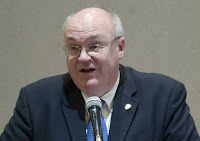State Supreme Court strikes down medical review panels for suits against health-care providers; backers eye constitutional change

Franklin Circuit Judge Phillip Shepherd
(Courier Journal photo by David Lutman
—
Filtering medical-malpractice lawsuits through panels of health-care professionals is unconstitutional, a unanimous Supreme Court of Kentucky ruled Thursday.
The General Assembly passed the law in 2017 at the behest of doctors and nursing homes, which had long lobbied for it, and also by “hospitals and other health providers as means to limit what they claimed were frivolous lawsuits,” notes Deborah Yetter of the Louisville Courier Journal.
The court “said the law is unconstitutional because it delays access to the state’s courts for adjudication of common-law claims,” Jack Brammer reports for the Lexington Herald-Leader.
Chief Justice John Minton wrote in the ruling, upholding Franklin Circuit Judge Phillip Shepherd, “Of all the rights guaranteed by state constitutions but absent from the federal Bill of Rights, the guarantee of a right of access to the courts to obtain a remedy for injury is possibly the most important.”
The bill’s main sponsor, Sen. Ralph Alvarado, R-Winchester, said in August that if the law were overturned, he would favor a constitutional amendment to allow it. Section 64 of the state constitution bans limits on the right to recover damages, and business interests have long wanted to change or repeal it. When Republican Gov. Matt Bevin signed the measure into law, he called it it “the first step toward tort reform.”
The Kentucky Medical Association said it was “extremely disappointed” because “Kentucky now remains one of the few states in the country with no meaningful tort reform.”
“The law requires that claims filed against doctors, hospitals, nursing homes, their executives and other health care providers must first be evaluated by panels composed of three medical providers before proceeding in court. The panels’ opinions could be entered as evidence in any subsequent litigation,” Brammer recounts. “Shepherd struck down the law in October 2017, saying it ‘protects the economic interests of the health-care industry at the expense of consumers, with no demonstrable benefit to the public at large.’ The case bypassed the Kentucky Court of Appeals,” but Shepherd allowed the law to remain in effect on appeal.
“The law had created a large backlog of several hundred malpractice cases awaiting assignment and review by state-appointed panels before they could proceed to court, while relatively few cases had been decided,’ Brammer reports. “It’s not clear what will happen to those cases now,” Yetter writes.